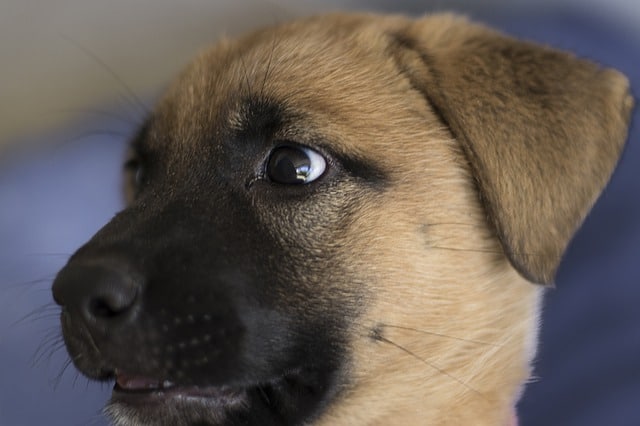One of the most common things you have to deal with when you have a canine member in your family is mouthing.
From a dog’s perspective, it is a ‘harmless’ way of showing excitement, affection, and curiosity.
While you may find the behavior cute and harmless, other members of your family or your guests might think that it is annoying and embarrassing. Besides, what may seem like a cool behavior during puppyhood won’t be so amusing when your pup’s teeth grow stronger.
Understanding the cause of mouthing tendencies in dogs can help you eliminate the behavior before it becomes aggressive or destructive.
So, why do dogs bite when they are excited?
Though we can’t tell you exactly why your pup nips, here are potential reasons why your dog might bite you when excited.
1. He thinks you are playing
If your dog loves to play with other dogs, he may sometimes assume that he can also play with you any game, including jaw wrestling.
In other words, your dog doesn’t understand the limits of play and takes it too far. When he gets excited, he may think that it is okay to nip, but he doesn’t know where to draw the line.
2. Inappropriate games
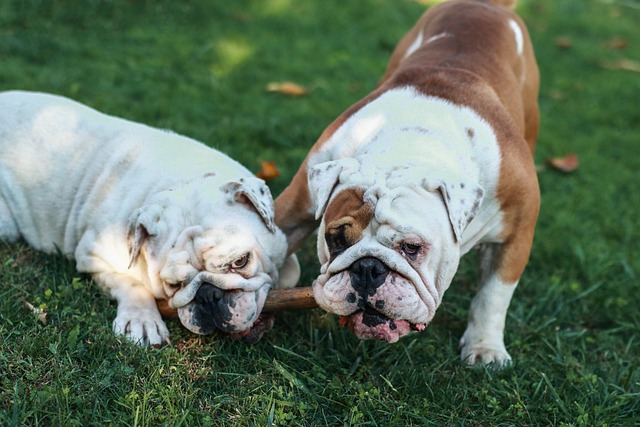
Roughhousing with your dog in a way that encourages him to make mouth contact with your skin or clothes may also promote mouthing.
If your dog is often exposed to rough-and-tumble games—perhaps by your partner or dog sitter/handler—he’s likely to bite you when excited.
3. Investigating their environment
Dogs explore their environments with their noses and mouths. So, when your pup nips you when he is excited, he is testing his boundaries, investigating different stimuli, or simply understanding the situation or environment.
4. Teething
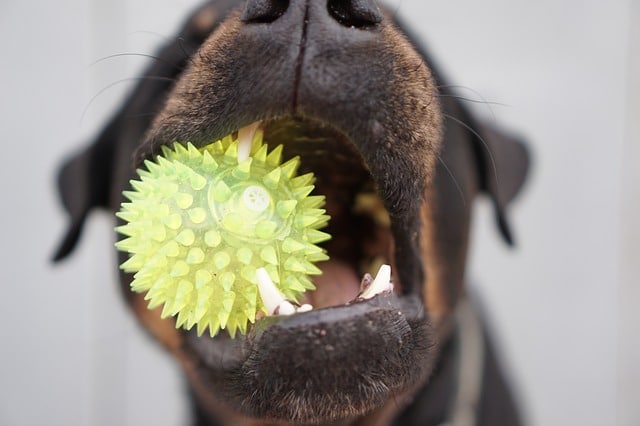
During the first phase of their cognitive and physical development, puppies are always keen to not only put almost anything in their mouths but also bit everything they find in their space.
Like a human toddler, a lot of changes occur in your dog’s dentition during the teething stage. So, puppies will seize any opportunity that can relieve the pain and discomfort caused by the sensation, including biting you when they are excited.
5. Early experiences in the litter
Puppies that didn’t have littermates or those that were taken away from their litters a bit earlier (before 8 weeks) are more likely to bite you when they are excited.
Canine experts believe that these puppies often fail to learn bite inhibition because they don’t have siblings to let them know when they are biting too hard.
6. Insufficient mental stimulation and physical exercise
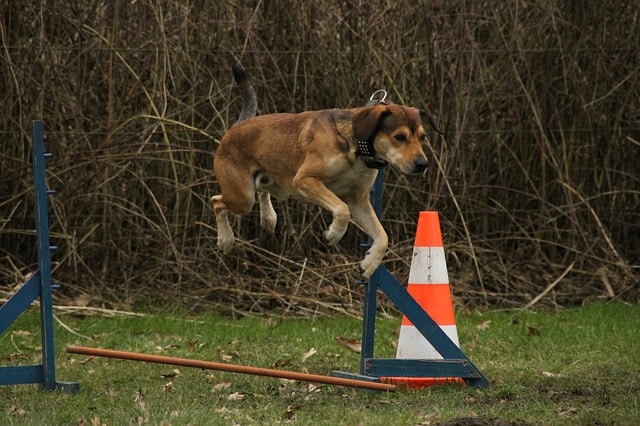
Another potential reason why your pup might nip is boredom.
Insufficient exercise and mental stimulation translate to excess energy in your dog, which prompts him to play with his mouth.
In particular, inadequate mental stimulation and physical exercise encourage biting when your pup is excited because he is trying to find the best way to engage you in his game.
Biting or putting something in his mouth makes him feel busy and calmer.
7. Initiation to the canine culture
Puppies may also bite to learn and adapt to the social mores of the canine culture.
Remember that dogs don’t play video games or with Barbie dolls like our kids—they race, chase, pounce, wrestle, tug, and play a lot of face-bite games.
So, nipping you when he’s excited may also be serving a more serious purpose: learning the vital lessons that he needs to mastered to survive in the canine world.
8. Dog breed
Some dog breeds are more likely to nip you when they are excited than others.
Australian Shepherds, Border Collies, and Shelties, for instance, are known to be more prone to nipping because they mimic livestock herding behaviors that they were originally bred for.
These dogs were bred to nip at the ankles of animals they are herding in order to move them in the right direction.
As such, it is not uncommon to find these dogs nipping your ankles or those of your children when they are excited, especially when they learn that nipping makes you move faster or squeal.
9. Underlying health conditions
Besides the above behavioral issues, your dog may also nip due to health reasons.
Conditions like hyperthyroidism, for instance, maybe the main reason why your canine buddy is excited in the first place.
If you notice that your dog bares his teeth or is a bit tense when he is biting, it could be a sign of less friendly behavior. In such situations, enlist the services of a certified vet before the behaviors get out of hand.
Dos and Don’ts When a Dog Bites You When Excited
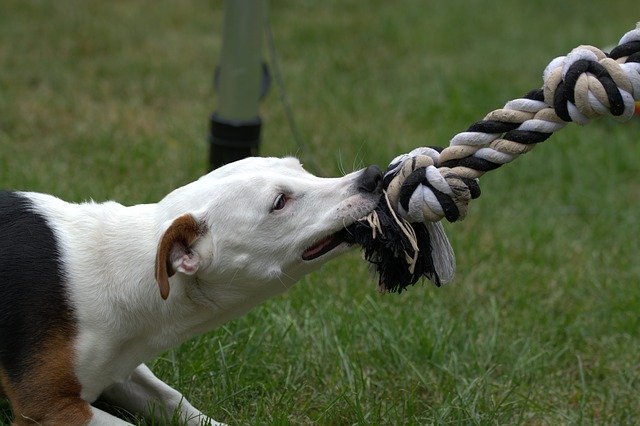
Now that you understand why your pup may bite when he is excited, it is important to know how to deal with the behavior.
Here are some top dos and don’ts that you need to keep in mind:
- Do engage in non-contact games like fetch with your pup. This way, your dog will always look for that motion-activated toy you recently bought him when he feels like biting something when he is excited.
- Do give your dog the opportunity to play with other dogs to reduce his urge to play rough or bite you when he is excited. Ensure that the dogs are friendly and vaccinated.
- Do expose your dog to impulse control by teaching him commands like sit, off, wait, leave it etc. This can discourage your dog from indulging in any form of mouthing or nipping.
- Do withdraw attention every time your dog tries to nip you due to hyperactivity. If possible, walk away for a minute or two, come back and resume interaction with him. If he nips you again, repeat the exercise until he learns that nipping interferes with the interaction.
- Do supply your dog with lots of toys when he is excited to redirect his nipping tendencies to something more appropriate.
Here are some of the best categories of toys we recommend for hyperactive dogs:
10 Best Motion Activated Dog Toys
8 Best Chew Guard Technology Dog Toys
- Do take your dog out somewhere where there is no human interaction if you notice that he is too excited. This can go a long way in helping him settle down a bit.
- Do spray appropriate taste deterrent on your hands, feet, clothing, and areas that he likes to bite before you interact with your dog. If he nips you, don’t move and give him time to interact with the deterrent. Consider rewarding or praising him when he lets go of your hand or feet.
- Don’t wave your hand or toes in your dog’s face or slap him in a way that can entice him to play. All these things may encourage him to bite your hands or feet.
- Don’t discourage your pup to play with you at all. Instead, encourage him to play gently with you and ensure that he is always exposed to appropriate games. Remember that play builds a stronger owner-dog bond.
- Don’t jerk your hand or feet away from your canine friend when he bites you because of excitement. He may interpret it as a game and continue to reach out for your hand. Consider letting your hands or feet go limp so that your dog finds them boring to play with.
- Don’t punish your dog for nipping you when he is excited because it can make your dog afraid of you. It can also worsen his aggressive behaviors. Slapping or hitting your dog for playful mouthing is not recommended either as it can encourage them to bite harder or play more aggressively.
Final Thoughts-Why Does My Dog Bite Me When Excited?
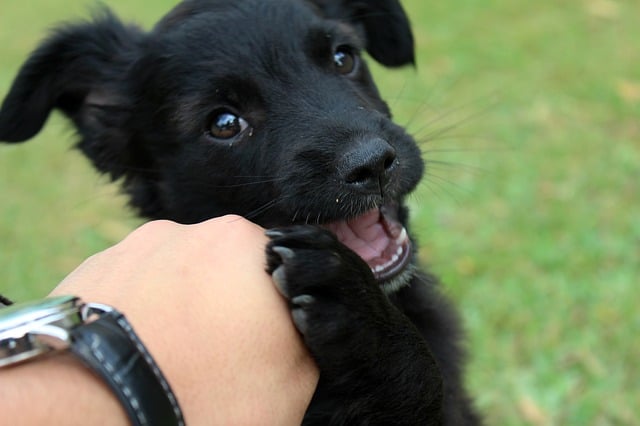
If you’ve been wondering why your dog bites you when he is excited, we hope that you now understand the root cause of this behavior.
Essentially, your dog won’t intuitively understand how you want him to behave. It is, therefore, your responsibility to teach him that behaviors like nipping you when he is excited is bad.
Put in practice the above-highlighted dos and don’ts to discourage the nipping behavior before it worsens.
While some of the above suggestions may be hard to implement, ensuring that your dog is well-behaved is worth the effort because it is easier to control and more enjoyable to walk around a well-mannered canine.
Remember to be consistent with your training as the nipping behavior may sometimes erupt due to lack of training or after prolonged inactivity.
Related Posts:
Why Is My Dog Aggressive Towards Me But Not My Husband?
Why Is My Dog Aggressive When I’m On My Period?
Dog Boarding For Aggressive Dogs: Everything you Need to Know
As an Amazon Associate, we may receive a small commission from qualifying purchases but at no extra cost to you. Learn more. Amazon and the Amazon logo are trademarks of Amazon.com, Inc, or its affiliates.

